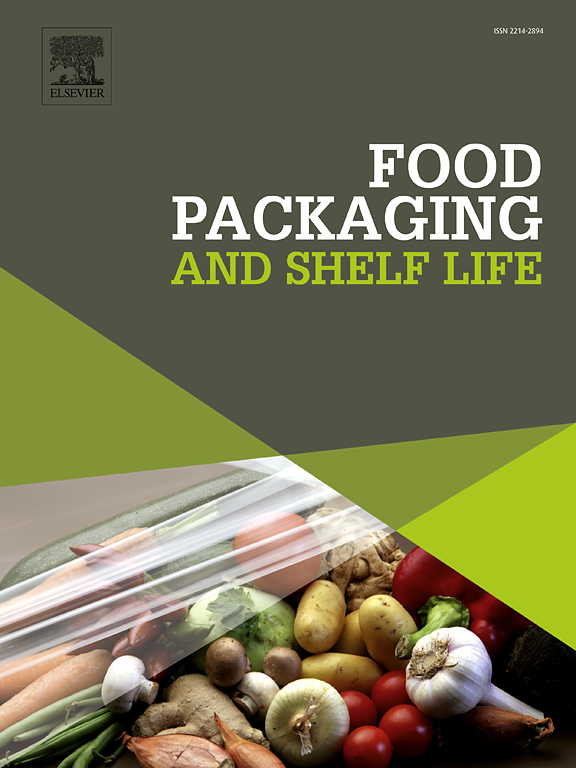Application of argon cold plasma on active polybutylene succinate and thermoplastic cassava starch film with Makwaen essential oil to improve shelf-life of pork sausage
IF 10.6
1区 农林科学
Q1 FOOD SCIENCE & TECHNOLOGY
引用次数: 0
Abstract
This research aimed to enhance the properties of a biodegradable film made from polybutylene succinate and thermoplastic starch, using an Argon cold plasma (Ar-CP) treatment followed by coating with Makwaen pepper extract (ME) to extend the shelf-life of cooked pork sausages. The ratio of polybutylene succinate and thermoplastic starch was 80:20 w/w, produced by blown film extrusion, which was assessed and treated using non-thermal plasma. Cold plasma's optimal condition was 120 W for 15 s, resulting in the film’s higher tensile strength of 21.16 MPa and elongation of 293 % than untreated film. The roughness of the surface measured by the atomic force microscope was increased after cold plasma treatment. The hydrophilic characteristic was enhanced due to a greater homogeneous surface structure as detected by scanning electron microscopy and evidenced by a decreased contact angle. When applied with 80 % ME, the plasma-treated film had a higher adhesion ion, tensile strength of 19.84 MPa, and elongation of 244 %. After plasma treatment, the water vapor transmission rate remained unchanged (0.035 g.mm/cm2.day.mmHg). Pork sausages packed with this film and stored at 25ºC had an extended shelf-life of 72 h and reduced thiobarbituric acid reactive substances and total bacterial count compared to the control. Ar-CP treatment combined with ME coating significantly improved the biodegradable film's mechanical properties and surface characteristics, extended the shelf-life of cooked pork sausages, and enhanced preservation quality. This research improves biodegradable films' performance, extends food shelf-life, and provides innovative solutions for applying packaging materials, contributing to sustainable food production and improved nutrition.
氩冷等离子体制备活性丁二酸聚丁二烯和木薯热塑性淀粉膜,提高猪肉香肠的保鲜期
本研究旨在通过氩冷等离子体(Ar-CP)处理,再涂上Makwaen辣椒提取物(ME),提高由聚丁二酸丁二烯和热塑性淀粉制成的可生物降解薄膜的性能,以延长熟猪肉香肠的保质期。采用吹膜挤出法制备的聚丁二酸丁二烯与热塑性淀粉的比例为80:20 w/w,采用非热等离子体进行评价和处理。冷等离子体的最佳条件为120 W、15 s,膜的抗拉强度为21.16 MPa,伸长率为293 %。冷等离子体处理后,原子力显微镜测得的表面粗糙度有所提高。通过扫描电子显微镜检测到的更均匀的表面结构和减少的接触角证明了亲水特性的增强。当添加80 % ME时,等离子体处理后的膜具有较高的附着离子,抗拉强度为19.84 MPa,伸长率为244 %。等离子体处理后,水蒸气透过率保持不变(0.035 g.mm/ cm2.2 .day. mmhg)。用这种薄膜包装并在25ºC下保存的猪肉香肠的保质期延长了72 h,与对照组相比,硫代巴比妥酸活性物质和细菌总数减少了。Ar-CP处理结合ME涂层可显著改善生物降解膜的力学性能和表面特性,延长熟猪肉香肠的保质期,提高保存质量。本研究提高了生物可降解薄膜的性能,延长了食品的保质期,为包装材料的应用提供了创新的解决方案,为可持续食品生产和改善营养做出了贡献。
本文章由计算机程序翻译,如有差异,请以英文原文为准。
求助全文
约1分钟内获得全文
求助全文
来源期刊

Food Packaging and Shelf Life
Agricultural and Biological Sciences-Food Science
CiteScore
14.00
自引率
8.80%
发文量
214
审稿时长
70 days
期刊介绍:
Food packaging is crucial for preserving food integrity throughout the distribution chain. It safeguards against contamination by physical, chemical, and biological agents, ensuring the safety and quality of processed foods. The evolution of novel food packaging, including modified atmosphere and active packaging, has extended shelf life, enhancing convenience for consumers. Shelf life, the duration a perishable item remains suitable for sale, use, or consumption, is intricately linked with food packaging, emphasizing its role in maintaining product quality and safety.
 求助内容:
求助内容: 应助结果提醒方式:
应助结果提醒方式:


